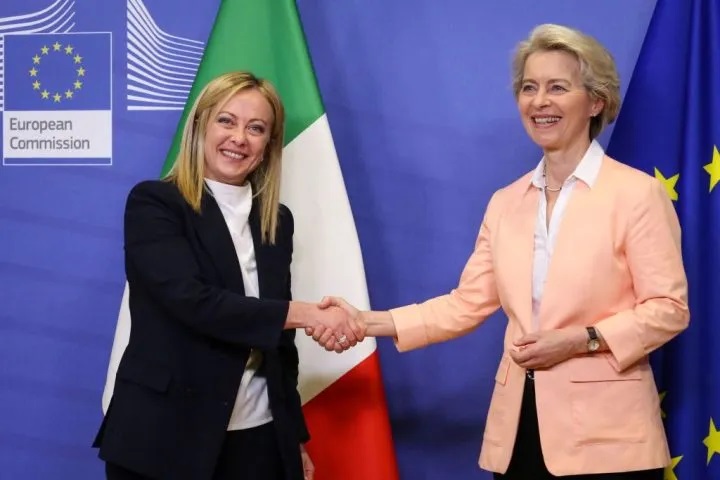When it became clear in September 2022 that Giorgia’s Meloni right-wing coalition was on course to win Italy’s general election, Ursula von der Leyen issued a warning. “If things go in a difficult direction,” declared the president of the European Commission, “…we have tools.”
Matteo Salvini, whose Lega Party was a member of the coalition, denounced von der Leyen’s threat as “shameful arrogance.”
The marriage of convenience between von der Leyen and Meloni has benefited both in the last two years
The German’s fears have proved unfounded. Meloni’s government hasn’t gone in a “difficult direction.” On the contrary, Meloni seems to have moved gently to the center, where von der Leyen resides. The two are often in each other’s company, touring flood-hit regions of Italy or visiting Lampedusa to see how the island is coping with the influx of migrants.
It is a mutually beneficial alliance. Italy is in line to receive $208 billion from the European Union’s Recovery and Resilience Facility (RRF), an initiative implemented in the wake of Covid-19. Some of this money comes in grants and the rest in loans: the first payment $23 billion — was issued in April 2022 and the third — $20 billion — last October. Italy needs the money so Meloni knows that even if she was tempted to head off in a “difficult direction” she could be reined in by von der Leyen. The commission president made an example of Poland and froze more than $109 billion in recovery funds to the country in 2021, money that was eventually handed over last month once the governing Law and Justice (PiS) Party had been voted out of power.
But von der Leyen now needs the support of the Italian prime minister. She recently announced that she wants to serve another five-year term as president of the commission, but her re-election is not a given.
She only narrowly got the job in 2019 (polling just nine votes above the minimum requirement in the European parliament), and her presidency has hardly been a roaring success. There are some within her center-right group, the European People’s Party, (the biggest group in Brussels) who want her gone, notably France’s Républicain Party. Their candidate in June’s European election is Francois-Xavier Bellamy, who recently described von der Leyen as having “done a great deal to weaken” the EU during her presidency.
Bellamy’s dislike of von der Leyen is nothing compared to the hatred she incites among other European politicians. Matteo Salvini — Meloni’s deputy PM — said last month that von der Leyen’s “wretched and sinister commission…is destroying Europe.”
Marine Le Pen’s National Rally Party in France holds the same opinion. One of its candidates in the European election is Fabrice Leggeri, who between 2015 and 2022 was the director of Frontex, the EU agency responsible for border control. He has been scathing of von der Leyen in recent interviews, claiming that for the EU currently “immigration is not a problem but a project.” He has described her New Migrant Pact — announced with much fanfare last December — as totally inadequate.
Le Pen and Salvini’s parties belong to the Identity and Democracy Group in Europe, as do Geert Wilders’s Partij voor de Vrijheid (Party for Freedom), Germany’s AfD, Austria’s Freiheitliche Partei Österreichs (Freedom Party) and Chega, the Portuguese party that did so well in Sunday’s election. They believe that removing von der Leyen from office is the first step in Europe regaining control of its borders and stopping the encroachment of progressive policies into legislation.
The other right wing group in Brussels is the European Conservatives and Reformists (ECR), whose president is Giorgia Meloni. As well as her Fratelli d’Italia Party, the ECR includes among its members Poland’s PiS (Law and Justice), Spain’s Vox and Éric Zemmour’s Reconquête! (Reconquest) in France.
The Poles obviously loathe von der Leyen, accusing her of being “anti-democratic,” and she has no credibility within Reconquest either. Its vice president, Marion Maréchal, called von der Leyen’s presidency “disastrous” because “for five long years she has disarmed Europe in the face of the explosion in immigration.”
Marechal is married to Vincenzo Sofo, who serves in Meloni’s Fratelli d’Italia, hence the reason Reconquest have joined ECR and not the more right-wing Identity and Democracy Group.
The marriage of convenience between von der Leyen and Meloni has benefited both women in the last two years. But will it endure the increasingly acrimonious campaigning for June’s European election?
If Meloni supports von der Leyen it will create divisions within her ECR Group, and provide ammunition to Le Pen and Salvini. Le Pen and Meloni have never got on; there are, as the Frenchwoman has explained in the past, political “differences” and there is probably an element of envy on the part of Le Pen. She was for many years the female face of the European right. Then along came the Italian upstart to steal limelight. Forbes magazine recently listed the 100 most powerful women in the world: von der Leyen was first, Meloni fourth and Le Pen was no where to be seen.
Le Pen also shares Salvini’s belief that Meloni is not as right wing as she would have the world believe. She seems relaxed in the company of the global centrist elite, whether it’s von der Leyen, Rishi Sunak or Justin Trudeau. She also gets on well with Joe Biden, whereas Salvini makes no secret of who he wants to win the US election. “Forward Republicans, forward Donald Trump, forward with change!” he tweeted after the Super Tuesday results last week. “It will take place in 2024, in the USA and Europe.”
The change that Salvini wants in Europe is the demise of Ursula von der Leyen. A great many others want it, too, but does Meloni? In 2020, she decried the “Brussels techno-bureaucrats,” but once in office she quickly understood that they have the power and, more importantly, the money that Italy so desperately needs.
If you can’t beat the centrists, you might as well as join them.
This article was originally published on The Spectator’s UK website.


























Leave a Reply